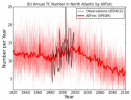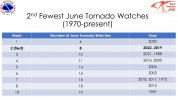I completely agree that no observed downtrend Atlantic hurricane activity at all. Actually last 5-6 years were relatively active. But warmer sst not systematicly equal to more intense TCs and there were quite many studies on this. It's also not that simple or one dimensional question and one can conclude different opinion on this.I don't think we have enough data to say that climate change has a deterministic effect on tornadoes or tornado outbreaks. Things like tropical cyclones are more straightforward since they're large-scale atmospheric processes and the deterministic effects (warmer SSTs = more intense TCs) are pretty obvious. Tornadoes are small-scale processes with a lot more variables to control for, so it's harder to demonstrate deterministic effects empirically, much less the kind of stochastic effects that are likely to be more significant in tornado events than tropical cyclones.
This is further complicated by the differences in data-gathering processes between tropical cyclones (which we can measure directly in a consistent way) and tornadoes (which we measure based on estimates that aren't always applied consistently). The fact that accurate data on the number/intensity of tornadoes only goes back about 50 years is also a confounding problem, since that roughly coincides with the last negative global temperature anomalies in the late 1970s. I'd be curious to know what you consider a "high end" tornado outbreak, because I'm skeptical that there's actually been a consistent downward trend in those events. Obviously the last couple of spring seasons in the plains have been quiet, but there have been substantial events in the south during that period and some potent plains setups (e.g. 20 May 2019) that have underperformed for reasons that I think would be difficult to empirically link to climate change. I'm not saying it's not a possibility, but I don't think we have enough data to say that there's a causal relationship--assuming there's even an effect, which I'm not totally convinced of.
I'm also not sure what you mean about "weaker" Atlantic hurricane seasons; six of the top ten seasons for total accumulated ACE have occurred within the last 27 years, along with four of the top ten individual hurricanes in terms of ACE. In that timespan, we've only had six below average seasons (none since 2015) vs. 17 above average seasons, 10 of which were highly active; last year was the first "near normal" season since 2015. Obviously there's some recency bias in that data as well since we're undoubtedly missing some storms from before the satellite era, but I don't know how you look at that data and come to the conclusion that Atlantic hurricane seasons are getting weaker. You would expect hurricanes to get more intense with warming SSTs, all other things being equal.
This paper had good research on it and come to the conclusion that thermodynamic component of climate change would lead to significant reduction of TC activity by end of 21 century. The main reason are as follows:
1 a reduction in upward vertical motion
2 increased CIN
3 increase in the midlevel moist entropy saturation deficit
4 increase in incubation parameter
Another study lead by NHC found similar things about it and you can also see no notable observed downtrend as least up until now:



Can we detect a change in Atlantic hurricanes today due to human-caused climate change?
Two NOAA hurricane experts explain why it’s still so hard to say whether global warming to date has affected the number or intensity of Atlantic hurricanes.
Speaking of a reduction of upward vertical motion and increased CIN, we also see this trend in US and other places over the world and it without a doubt cast an impact on severe weather and tornados.


With those pics shows, we actually see strong CIN and weaker low level lapse rate decades by decades and it's due to mid level atmosphere warmer faster than ground level which is easy to understand just by the definition of global warming process.
And we indeed already see the result from this trend. We have seen the downtrend of number of tornado days in a year in last two decades. We used to have on average well over 200 days in one year with one or more tornados confirmed and now it dropped to around 140-160 days with tornado confirmed and you have to consider that we even now have much better detect technology due to advanced radar and more video recording. It also lead to the downtrend of number of consecutive days events like the pic below showed. Grazulis also noted this trend and once mentioned it on his Twitter.

This downtrend related to significant reduction of summer time tornados and there was also research about the reason behind.
Possible connection between U.S. tornado activity, Arctic sea ice
The effects of global climate change taking place in the Arctic may influence weather much closer to home for millions of Americans, researchers report.
www.sciencedaily.com
June used to be a big month for tornado activity without a doubt but now there was even years like 2020 that not a single sig tornado observed in entire june which would be unimaginable in the past. With the pic below, you can see almost all years with very low activity happened recently.

Just talking about my personal experience, I do feel there's more cap Forecasted Convective Amplification Deficiency in late May and June than in the past. And it's not easy to say the infamous cap Forecasted Convective Amplification Deficiency of May 20 2019 have 0 relation with the stronger cap nowadays due to warming process. Also I think andyhb or someone else made a nice chart about post-2012 severe weather condition in main season:

Speaking of large scale outbreaks, just like situation in hurricanes, are more harder to have any conclusion. Iike the post I have above, there's a likely shift of tornado season due to warming and now we've seen the most impressive tornadic supercell and the longest track in december and arguably the most impressive tornadic supercell and the longest track in january in two consecutive severe second season. Does it mean something? I'm not truly sure. If the shift do happen, would it compensate the major reduction of summer tornado activity?I have no idea. Like you said, history with reliable tornado data is relatively limited and all we need to do is wait and continued research on it before jumping into the absolute conclusion.
Last edited by a moderator:


